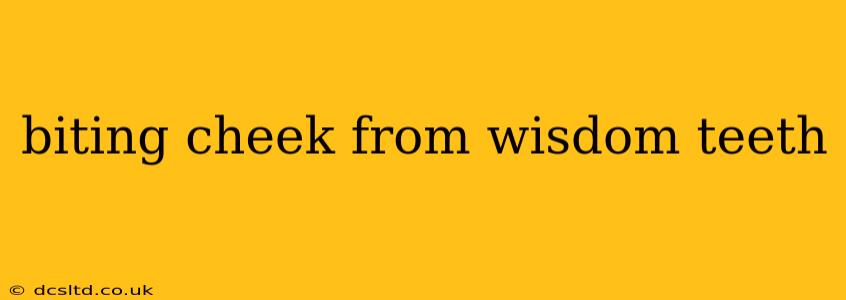The arrival of wisdom teeth is often accompanied by discomfort, and one frustratingly common symptom is accidentally biting your cheek. This can range from a minor annoyance to a significant source of pain, especially when dealing with already inflamed or impacted wisdom teeth. This article will delve into the reasons why this happens, how to prevent it, and what to do if you do bite your cheek.
Why Do I Keep Biting My Cheek When I Have Wisdom Teeth?
The primary culprit is often the altered position of the wisdom teeth themselves. These third molars erupt later in life, and their emergence can push against your existing teeth, altering the way your jaw fits together. This shift can lead to unexpected bites and increased sensitivity in the area. Swelling from impacted or infected wisdom teeth can further exacerbate the problem, making it harder to accurately gauge where your teeth are positioned in your mouth.
What to Do If You Bite Your Cheek
Accidents happen, and even with the utmost care, biting your cheek is a possibility. The first step is to assess the damage.
-
Minor Bites: For minor nicks or abrasions, rinsing with warm salt water (1/2 teaspoon salt in 8 ounces of warm water) can help clean the area and prevent infection. Applying a cold compress can reduce swelling and pain. Over-the-counter pain relievers like ibuprofen can help manage discomfort.
-
More Significant Injuries: If the bite is deep, bleeding profusely, or you suspect a significant tear, seek immediate medical attention. A deep bite can lead to infection if not properly cleaned and treated.
How Can I Prevent Biting My Cheek During Wisdom Tooth Eruption?
Prevention is key, and several strategies can help reduce the likelihood of biting your cheek:
-
Soft Foods: Opt for soft foods that require minimal chewing during the eruption process. This reduces the pressure on your cheeks and gums.
-
Mindful Chewing: Practice mindful chewing. Pay close attention to the position of your jaw and teeth while eating to minimize accidental bites.
-
Dental Checkups: Regular dental checkups are crucial for monitoring the eruption of your wisdom teeth. Your dentist can assess the position and potential for complications, helping to prevent problems early on.
-
Consider Extraction: If your wisdom teeth are impacted or causing significant problems, your dentist may recommend extraction. This is a preventative measure to eliminate the potential for further complications, including accidental cheek biting.
Are There Long-Term Effects from Repeated Cheek Biting?
While a single bite is typically not a major cause for concern, repeated cheek biting can lead to:
-
Chronic Soreness: Constant irritation can make your cheeks perpetually sore and tender.
-
Increased Risk of Infection: Repeated trauma to the cheek's lining increases the risk of infection.
-
Development of Ulcers: Persistent biting can lead to the formation of mouth ulcers.
Can I Use Mouthguards to Protect My Cheeks?
While not specifically designed for wisdom tooth-related cheek biting, a custom-fitted mouthguard from your dentist might provide some protection. However, it's essential to consult with your dentist to see if this is a suitable option in your situation.
When Should I See a Dentist About Cheek Biting?
It's advisable to contact your dentist if:
- The biting is persistent and painful.
- You develop a significant mouth injury from a bite.
- You experience signs of infection, such as increased pain, swelling, or pus.
Remember, managing wisdom tooth eruption effectively involves both proactive measures and appropriate medical care. Don't hesitate to seek professional guidance if you're experiencing persistent discomfort or complications.
